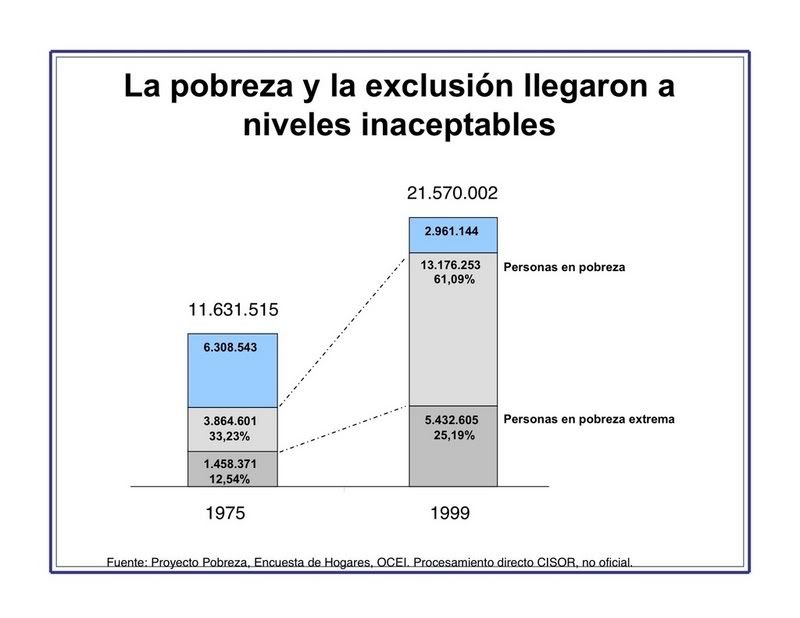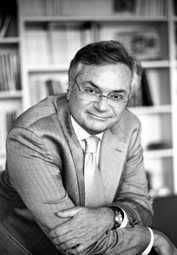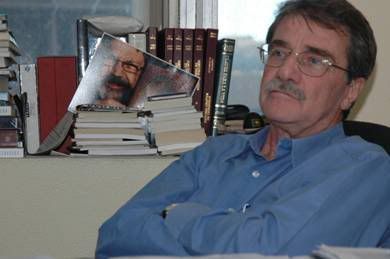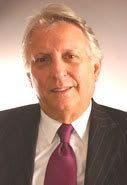Tuesday, April 17, 2007
The bright lights that brought Venezuela to ruin
In flipping through a recent presentation on Venezuela’s social composition I ran across this slide:

The numbers in blue show Venezuelans not in poverty, the light grey represents Venezuelans in poverty, and the dark grey shows Venezuelans in extreme poverty.
Now, we needn’t focus on the exact number and percentages, they may well overstate poverty somewhat. Yet the dramatic trend can’t be missed. Venezuela went from a country with a large middle class to a country that was mainly impoverished. The downward trend in the standard of living over those 24 years simply can’t be missed nor downplayed – a very large portion of Venezuelan society was brought to ruin.
Fortunately, we’ve seen this trend start to be reversed in recent years with decreasing poverty, rising incomes and more jobs being created by the Chavez government.
The question is, how could this social and economic implosion have been allowed to happen over 24 years? Who was minding the store – or better put, was asleep at the wheel, while this s occurred?
The truth is it had many “fathers”. Yet there is no small irony in who played a very prominent role – the same people who critique Chavez’s every move, who now pretend to have all the answers, yet who when they had their chance in the government looked like a deer in the headlights.
Lets look at some examples. Moises Naim would be one. With graduate degrees from M.I.T. and stints at the World Bank and Carnegie Endowment for International Peace he would seem to be part of the Venezuelan “best and brightest”.

Moises Naim
So too would Ricardo Hausmann with his Ivey League economics PhD and Gerver Torres of Venezuela’s elite business school, the IESA.

Ricardo Hausmann
You’ve probably heard their names before, if for no other reason than they haven’t shied away from criticizing all the supposed shortcomings of the Chavez administration – Naim from his perch as the editor of Foreign Policy Magazine, Hausmann from the Harvard’s Kennedy School of Government and Torres from his own “Leadership and Vision”organization.
Yet in all their rants there is one thing you will seldom hear – that they all served in the cabinet of Carlos Andres Perez’s government in the early 1990s. Naim was the Minister of Trade and Industry, Hausmann the Minister of Planning, and Torres the Minister of Privatization. In other words, these three bright lights pretty much had control over all economic policy making for several years.
How did Venezuela fare under their stewardship? Well, lets just way, when the adults finally arrived to clean up their mess Venezuela faced the collapse of virtually its entire banking sector, hyper-inflation on a scale it had never previously known, and the shunting of millions more Venezuelans into poverty. In short these “doctors” were responsible for a bad case of economic malpractice.
Yet, the “IESA Boys” weren’t the only know it alls to play a key role in driving Venezuela into a ditch. Where they left off Teodoro Petkoff, an erstwhile “socialist”, picked up. Petkoff had spent more than a decade in the Venezuelan congress and run for president several times with nothing much to show for it. Yet in the mid-90s he was tapped to be Planning Minister in the Caldera government. At the same time Luis Guisti was given free reign as president of the state oil company, PDVSA.

Teodoro Petkoff

Luis Giusti
Now, you might not know it from Petkoff’s Tal Cual newspaper, which makes it seem as governing a country is a snap and any and all shortcomings are just Chavista incompetence, but Petkoff’s performance was hardly something to brag about. When he got through implementing his neo-liberal “Agenda Venezuela” the country had gone from slow growth to a sharp recession and when he left office he left behind a mess that included billions in unpaid back wages for civil servants (it took the Chavez administration until 2002 to pay off all the unpaid bills left behind by Petkoff).
While Petkoff was busy trashing the country as a whole Giusti was doing the same to Venezuela’s oil industry. Despite its bloated payroll it couldn’t even perform basic tasks like refining unleaded gasoline so one could smell Caracas before actually arriving there (the U.S. EPA actually banned Venezuelan refined gasoline in 1995). With OPEC quota busting production hikes, give away contracts to foreign oil companies and the duplicitous funneling of money overseas Giusti oversaw the tanking of oil prices and a stunning reduction on the revenues provided to the government. Although Chavez immediately fired Giusti upon assuming office such was the damage that it took years to get Venezuela’s oil industry turned around.
Read a newspaper article on Venezuela or read one of the “academic” papers on Venezuela and you are likely to run across these individuals. If nothing else, they know how to run their mouths, get in front of TV cameras, and make their way onto the Rolodex’s of reporters. Yet when it was their turn to walk the walk, they failed miserably. Doubt that statement? Take a good at the chart on top again.
Nevertheless, as much as they failed for the country they seem to have done very well for themselves - some have nice perches in think-tanks, others apparently made enough money to have their own investment firms, and yet others managed to get their own newspapers. It would appear being a cabinet member in the government of someone like Carlos Andres Perez can be quite rewarding.
Yet it may be all for the best. These people are now left to do what they do best – run their mouths. Venezuela now has a government that knows how to actually govern. And most importantly the Venezuelan people are a lot less likely to be dazzled by slick talking people with all the “right” degrees who don’t really turn out to be the best and the brightest after all.
|

The numbers in blue show Venezuelans not in poverty, the light grey represents Venezuelans in poverty, and the dark grey shows Venezuelans in extreme poverty.
Now, we needn’t focus on the exact number and percentages, they may well overstate poverty somewhat. Yet the dramatic trend can’t be missed. Venezuela went from a country with a large middle class to a country that was mainly impoverished. The downward trend in the standard of living over those 24 years simply can’t be missed nor downplayed – a very large portion of Venezuelan society was brought to ruin.
Fortunately, we’ve seen this trend start to be reversed in recent years with decreasing poverty, rising incomes and more jobs being created by the Chavez government.
The question is, how could this social and economic implosion have been allowed to happen over 24 years? Who was minding the store – or better put, was asleep at the wheel, while this s occurred?
The truth is it had many “fathers”. Yet there is no small irony in who played a very prominent role – the same people who critique Chavez’s every move, who now pretend to have all the answers, yet who when they had their chance in the government looked like a deer in the headlights.
Lets look at some examples. Moises Naim would be one. With graduate degrees from M.I.T. and stints at the World Bank and Carnegie Endowment for International Peace he would seem to be part of the Venezuelan “best and brightest”.

Moises Naim
So too would Ricardo Hausmann with his Ivey League economics PhD and Gerver Torres of Venezuela’s elite business school, the IESA.

Ricardo Hausmann
You’ve probably heard their names before, if for no other reason than they haven’t shied away from criticizing all the supposed shortcomings of the Chavez administration – Naim from his perch as the editor of Foreign Policy Magazine, Hausmann from the Harvard’s Kennedy School of Government and Torres from his own “Leadership and Vision”organization.
Yet in all their rants there is one thing you will seldom hear – that they all served in the cabinet of Carlos Andres Perez’s government in the early 1990s. Naim was the Minister of Trade and Industry, Hausmann the Minister of Planning, and Torres the Minister of Privatization. In other words, these three bright lights pretty much had control over all economic policy making for several years.
How did Venezuela fare under their stewardship? Well, lets just way, when the adults finally arrived to clean up their mess Venezuela faced the collapse of virtually its entire banking sector, hyper-inflation on a scale it had never previously known, and the shunting of millions more Venezuelans into poverty. In short these “doctors” were responsible for a bad case of economic malpractice.
Yet, the “IESA Boys” weren’t the only know it alls to play a key role in driving Venezuela into a ditch. Where they left off Teodoro Petkoff, an erstwhile “socialist”, picked up. Petkoff had spent more than a decade in the Venezuelan congress and run for president several times with nothing much to show for it. Yet in the mid-90s he was tapped to be Planning Minister in the Caldera government. At the same time Luis Guisti was given free reign as president of the state oil company, PDVSA.

Teodoro Petkoff

Luis Giusti
Now, you might not know it from Petkoff’s Tal Cual newspaper, which makes it seem as governing a country is a snap and any and all shortcomings are just Chavista incompetence, but Petkoff’s performance was hardly something to brag about. When he got through implementing his neo-liberal “Agenda Venezuela” the country had gone from slow growth to a sharp recession and when he left office he left behind a mess that included billions in unpaid back wages for civil servants (it took the Chavez administration until 2002 to pay off all the unpaid bills left behind by Petkoff).
While Petkoff was busy trashing the country as a whole Giusti was doing the same to Venezuela’s oil industry. Despite its bloated payroll it couldn’t even perform basic tasks like refining unleaded gasoline so one could smell Caracas before actually arriving there (the U.S. EPA actually banned Venezuelan refined gasoline in 1995). With OPEC quota busting production hikes, give away contracts to foreign oil companies and the duplicitous funneling of money overseas Giusti oversaw the tanking of oil prices and a stunning reduction on the revenues provided to the government. Although Chavez immediately fired Giusti upon assuming office such was the damage that it took years to get Venezuela’s oil industry turned around.
Read a newspaper article on Venezuela or read one of the “academic” papers on Venezuela and you are likely to run across these individuals. If nothing else, they know how to run their mouths, get in front of TV cameras, and make their way onto the Rolodex’s of reporters. Yet when it was their turn to walk the walk, they failed miserably. Doubt that statement? Take a good at the chart on top again.
Nevertheless, as much as they failed for the country they seem to have done very well for themselves - some have nice perches in think-tanks, others apparently made enough money to have their own investment firms, and yet others managed to get their own newspapers. It would appear being a cabinet member in the government of someone like Carlos Andres Perez can be quite rewarding.
Yet it may be all for the best. These people are now left to do what they do best – run their mouths. Venezuela now has a government that knows how to actually govern. And most importantly the Venezuelan people are a lot less likely to be dazzled by slick talking people with all the “right” degrees who don’t really turn out to be the best and the brightest after all.
|
